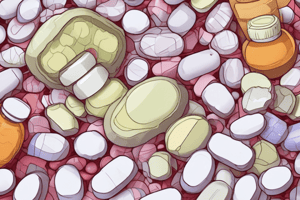Podcast
Questions and Answers
Which of the following are classifications of Aspirin? (Select all that apply)
Which of the following are classifications of Aspirin? (Select all that apply)
- Antiplatelet (correct)
- Antihistamine
- Analgesic (correct)
- Antipyretic (correct)
What is the mechanism of action of Aspirin?
What is the mechanism of action of Aspirin?
Impedes clotting and prolongs bleeding by blocking platelet aggregation by slowing prostaglandin synthesis action.
What is one indication for Aspirin?
What is one indication for Aspirin?
Acute myocardial infarction or myocardial ischemia.
Which of the following are contraindications for using Aspirin? (Select all that apply)
Which of the following are contraindications for using Aspirin? (Select all that apply)
What are common side effects of Aspirin?
What are common side effects of Aspirin?
Which conditions require precautions when using Aspirin? (Select all that apply)
Which conditions require precautions when using Aspirin? (Select all that apply)
What may potentiate the effects of Aspirin?
What may potentiate the effects of Aspirin?
What is the route of administration for Aspirin?
What is the route of administration for Aspirin?
Aspirin has an onset of __________ minutes.
Aspirin has an onset of __________ minutes.
The typical dosage of Aspirin is __________ mg.
The typical dosage of Aspirin is __________ mg.
Aspirin prevents the formation of __________ A2, which would cause platelets to aggregate.
Aspirin prevents the formation of __________ A2, which would cause platelets to aggregate.
What are the symptoms of Salicylate toxicity?
What are the symptoms of Salicylate toxicity?
Flashcards are hidden until you start studying
Study Notes
Aspirin Overview
- Classification includes antiplatelet, anti-inflammatory (NSAID), antipyretic, and analgesic properties.
Mechanism of Action
- Inhibits platelet aggregation by blocking thromboxane A2 formation, which also reduces inflammation by slowing prostaglandin synthesis.
Indications
- Primarily used for acute myocardial infarction and myocardial ischemia to prevent clotting.
Contraindications
- Not recommended for individuals with hypersensitivity, a history of GI bleeding or ulcers, known bleeding disorders, or acute asthma.
Side Effects
- Potential adverse effects include prolonged bleeding, GI bleeding, epigastric pain, heartburn, and nausea/vomiting.
Precautions
- Caution advised for patients taking warfarin or other anticoagulants, those with renal or hepatic disease, and asthmatic patients, as it may exacerbate respiratory issues.
Drug Interactions
- Can enhance effects of warfarin (Coumadin), increasing bleeding risk and requiring careful monitoring.
Routes of Administration
- Administered orally (PO) for effective absorption.
Onset & Duration
- Onset of action is between 5 to 10 minutes; therapeutic effects can last 1 to 4 hours, with anticoagulant effects up to 24 hours.
Dosage
- Typical dosage for acute conditions is 325 mg, equivalent to 4 chewable 81 mg tablets.
Salicylate Toxicity Symptoms
- Signs include hyperventilation, agitation, confusion, drowsiness, and sweating, indicating potential overdose or poisoning.
Studying That Suits You
Use AI to generate personalized quizzes and flashcards to suit your learning preferences.




